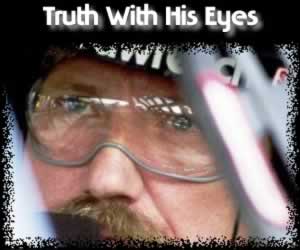|
Earnhardt always told the truth with his eyes
By DAVID POOLE
The Charlotte Observer
DAYTONA BEACH, Fla. -- It was always right there in his eyes.
Sometimes Dale Earnhardt didn't say much. But his eyes never stopped talking.
When pulled into an interview that he didn't want to do, Earnhardt never looked
at you. He stared off into the distance or hid the eyes behind sunglasses.
When you had his attention, however, he peered right through you. When you had
him engaged, you knew it.
When he was in a good mood, as he'd been this month as he raced sports cars and
stock cars at Daytona International Speedway, Earnhardt's eyes danced with
mischief.
He was a notorious needler. Last week he'd told Dale Jarrett that if Jarrett
were any kind of driver at all he'd drive the United Parcel Service truck seen
in ads for Jarrett's new sponsor instead of the No. 88 Ford.
If you were standing in the garage and somebody came up from behind and yanked
the cap off your head, chances are it was Earnhardt. He'd look back at you and
curl up one side of that cheesy mustache in a grin as fans chased him for an
autograph.
On the first weekend of February, Earnhardt raced in the Rolex 24 at Daytona on
a team that included his son, Dale Earnhardt Jr. Fellow drivers, road racers
Andy Pilgrim and Kelly Collins, kept telling everyone how serious Earnhardt was
about taking that event. They didn't have to say anything. You could read the
focus and the determination in Earnhardt's eyes.
When he climbed out of the yellow Corvette after his first driving shift, what
you saw was excitement and a desire to get back in the car for his next turn at
the wheel. "I was just getting into my rhythm," he said.
Early on the Sunday morning of that race, Earnhardt drove for more than two
hours through on-and-off-again rain. His team had told him what lap times they
wanted him to run and he was beating that by two seconds. He begged for more
time in the car.
When he got out of the car you could see how happy he was and that he thought he
was beginning to figure the whole thing out. His eyes were still driving the
course.
It was fun to see Earnhardt's eyes looking that young again.
One week later he was going to start another season in Winston Cup racing.
Although he was approaching his 50th birthday, he seemed more determined than
ever to regain the form that had brought him seven Winston Cup titles.
Earnhardt played by his own rules sometimes. He'd skip a news conference or
dodge an interview and the media would get riled up. When he didn't attend this
year's Winston Cup preview in Winston-Salem, we asked other drivers about it
until we found some to criticize Earnhardt for not being there, and then we
gleefully reported those criticisms.
The next week, we went to Dale Earnhardt Inc. headquarters for a stop on the
preseason media tour. There was a rumor that Earnhardt was going to show up
after we'd been first told he wouldn't. A showdown was looming.
Earnhardt was there. He answered questions about the criticisms and the season
ahead. He never once lost his cool or took a cheap shot at those who'd been
critical of him. He never said anything we could turn into a headline, other
than apologizing to fans he might have disappointed by not being in
Winston-Salem.
The look in Earnhardt's eyes that day was one of confidence. He knew he was in
control and there was nothing we were going to do to change that.
He turned it into a competition. Naturally, he won.
Don Hawk, who for many years worked alongside Earnhardt in his various business
dealings, once talked about his job interview with the man racing can never
replace.
They were on a private airplane and Earnhardt took out a cassette tape. He
wanted Hawk to hear a song by country star Travis Tritt about a young musician
vowing that he would one day be a star.
"I'm gonna be somebody someday," Tritt sang. "You can bet your
bottom dollar I will."
The outpouring of emotion that has followed Earnhardt's tragic death in Sunday's
Daytona 500 shows that Earnhardt was somebody.
He was the greatest driver, at least of his generation, in a sport that will
never be the same again. He was its champion seven times and its most
recognizable figure. He was a hero to millions of fans.
He was a star.
He was a businessman who owned race teams and chicken farms. He was a genius for
marketing his "Intimidator" image, which sold a lot of T-shirts while
also allowing him to carve out at least a small piece of privacy for him and his
family.
To his fans he was "The Man in Black."
He was "Earrrrrrnnn-harrrrrrrdtttt!"
But he was also a husband, a father, a son and, yes, a grandfather. His 50th
birthday would have been April 29, the day he should be racing at California
Speedway.
Instead, we're all still trying to deal with the horrible fact that we'll never
see him race again. He'd been around so long we'd come to take him for granted.
Now, we'll never be able to see another race without thinking about him.
For the rest of us, life goes on. The sun came up Monday morning in Daytona
Beach and in Kannapolis, the tiny North Carolina mill town he helped make
famous. There are sorrowful, painful days ahead.
It's hard for us to say what we really feel. Words just don't seem adequate.
That's OK. Just like it has always been with Dale Earnhardt, what we're really
feeling is right there in our eyes.
It's a tear.
|

